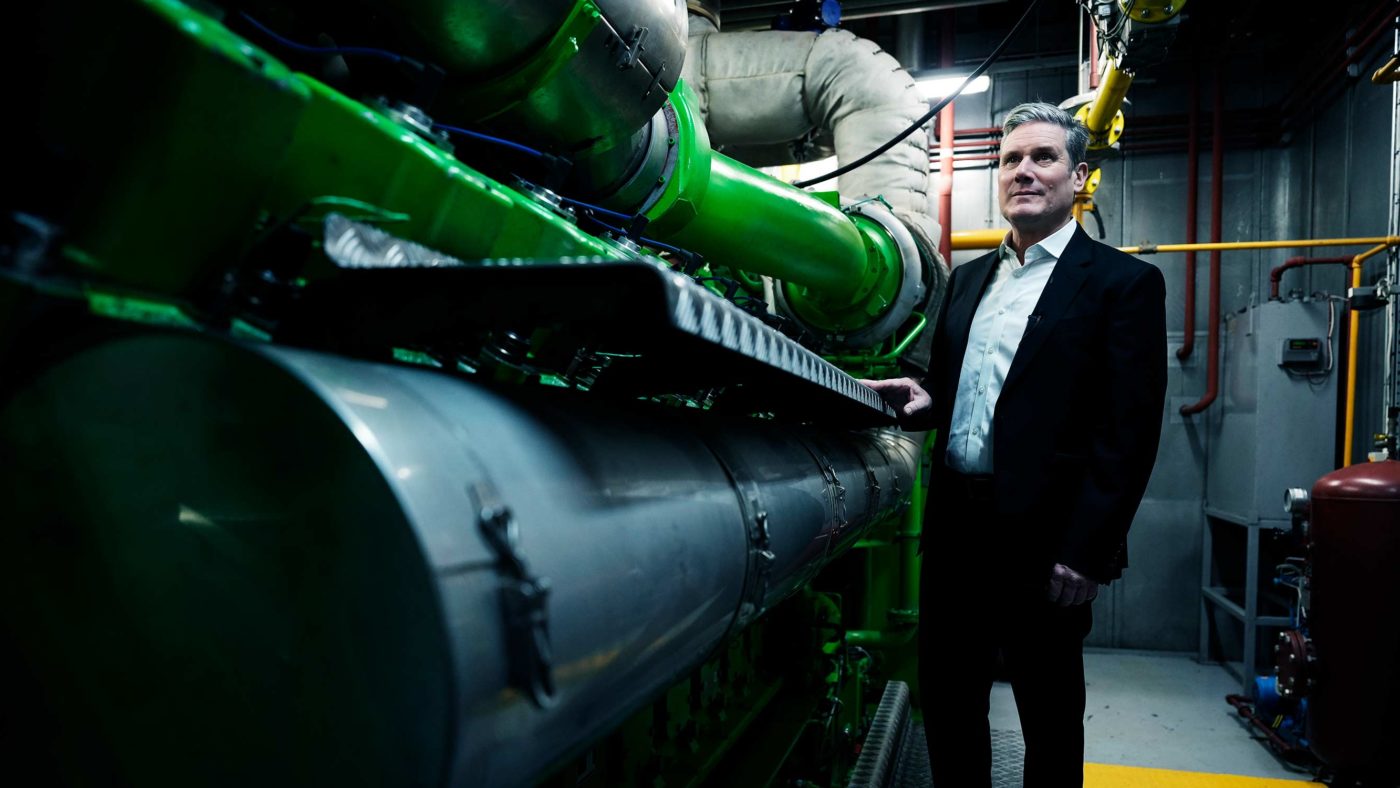After the hideous market and public reaction to the Government’s mini-Budget, Labour could announce a mission to build a moon base made of cheese and their poll ratings would still rise. There’s no moon base in the manifesto just yet, but what they have launched is a rather opaque Green Prosperity Plan to decarbonise power by 2030, supported by a sovereign wealth fund… meaning higher taxes, with future generation delivered by an ‘arms length’ state corporation, Great British Energy (GBE).
It remains unclear whether GBE will be an entirely new thing or both that and a life raft for energy companies destroyed by future policy. Although intended as the former, it seems likely it will become the latter. A giant BBC-style ‘corporation’ in the markets for building wind farms, nuclear power, carbon capture, batteries, and hydrogen projects will distort the market.
The problem is that seed funding comes from a bottomless pit of borrowing or higher taxes, at lower interest rates that don’t reflect project risk, which will crowd out private investment and may cause bankruptcies. When that happens, Labour’s instincts will be to incorporate the losers into GBE, not let them fail.
The idea this is ‘not nationalisation’ therefore feels like a rhetorical sleight of hand – and the market reaction, with energy stocks down 6-7% yesterday, confirms the concern.
However you dress up Labour’s proposal, it involves political control of activities best delivered by the market, using ‘the climate emergency’ and high energy prices as an excuse for bringing back Corbynomics – but now without the embarrassment of think tanks being able to put a £100-300bn price on the shopping list of seizures of private property.
Underlying the thinking is the fantasy of state ownership as a cure-all. The Opposition want to talk about solutions, with the help of hypothetical technology maps from technical experts, unencumbered by the stress test of what is economically affordable or practical. Worried it costs too much? Don’t worry… the Government is here to help. Worried about planning consents? Don’t worry…the Government is here to help. Worried the energy companies may be making promises they can’t keep? And so on…
GBE will also be a convenient way to duck questions about the cost of Net Zero and the low-carbon transition. It will just be assumed the wise civil servants running it will sort out the tricky bits, benevolently, in the public interest.
This is not, of course, how it works in practice. The short form of the problem with energy nationalisation is ‘would you trust Ed Miliband to buy a nuclear power station?’. Or, less glibly, restrain himself from applying pressure to GBE to respond to entreaties from local MPs demanding one in their constituencies to ‘create jobs’, regardless of the project case.
It’s an issue free market think tanks like the IEA have been addressing for decades. State control, or state direction of industry, leads to malinvestment and waste, higher prices and, in energy, risks security of supply. It replaces competition with a presumption of perfect foresight, the wisdom of technocrats, not the wisdom of crowds. And it means competing for the Treasury’s attention when times are tough – trading off funding a new carbon sink under the North Sea, say, against new treatments for kids with cancer.
It also doubles down on the existing problem of a low-carbon industrial complex, a collusion of corporate interests with decision makers to the exclusion of the public, driving up costs to hit political targets, which are themselves the result of extensive lobbying by those standing to gain. State ownership nationalises risks, while privately rewarding insiders and contractors.
Any return to the public ‘owners’ is illusory, the result of recycling proceeds from the higher energy bills paid for by those ‘owners’. Any losses loaded on to borrowing and future taxes, for example Obama’s Solyndra disaster, a $0.5bn error, rooted in green hype, or 20th century British nuclear power, which still costs us £3bn a year.
State ownership doesn’t stop poor decision making, just buries it behind a wall of political excuses. Even the best examples, such as Norway’s Statoil (now Equinor) had corruption problems. While EDF, the pseudo-private now nationalised French nuclear monopoly, has opaque finances, and was fined for their collusion with the UK Government over Hinkley Point. Both being ‘too big to fail’, they lack efficiency and transparency.
Yet these are the likely models for GBE and the sovereign wealth fund.
Labour, however, can claim their proposals are perfectly reasonable in light of what the Conservatives have already done, persistently moving the Overton Window to the left with ever more energy market intervention. The economically reckless part of the mini-Budget was not the £1.4bn a year top rate cut, but the £100-200bn cost of freezing energy prices, or ‘welfare on steroids’.
If that’s acceptable, then intervening to deliver new generation or energy saving that gets bills down for less seems perfectly reasonable. Even if Labour would in reality have to do both. If Conservatives introduce windfall taxes then Labour can make claims about extending them without damaging investment, however implausible. If Conservatives ban things from fracking to petrol cars and gas boilers, then Labour can make the case for more central planning.
It is hard to claim socialism doesn’t work when both sides are offering shades of socialism. It is harder to oppose nationalisation, even this milder form, when you’ve already nationalised price guarantees. But it is worth the effort. The UK will not decarbonise at any price and cannot keep borrowing to pretend otherwise. The case for markets, private companies, competition, and floating prices is efficient discovery of the best path. It is case that must be repeated again, and again, or we will all be paying the bill for decades to come.
Click here to subscribe to our daily briefing – the best pieces from CapX and across the web.
CapX depends on the generosity of its readers. If you value what we do, please consider making a donation.


